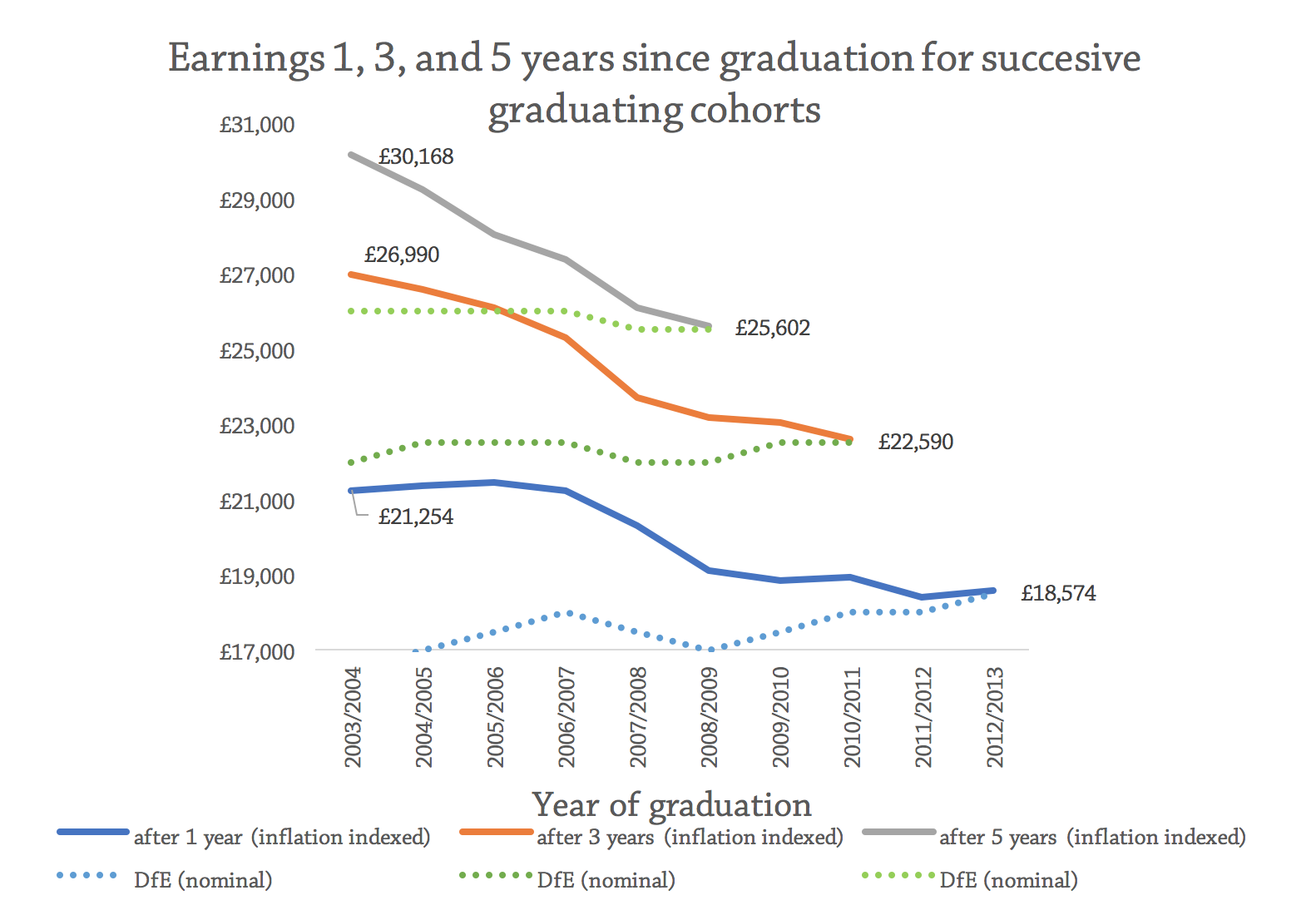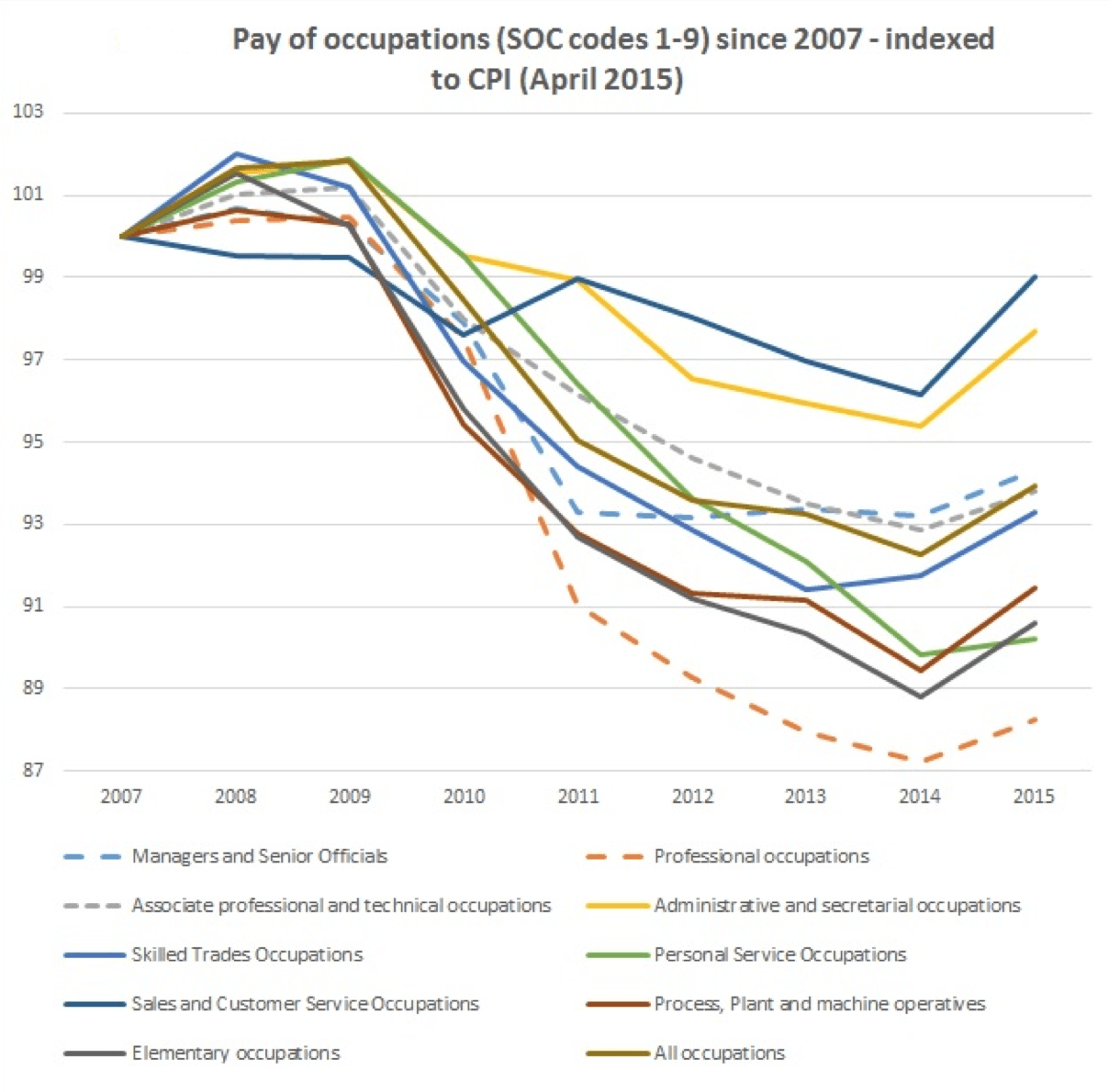For all their good work making the Longitudinal Education Outcomes data available, the Department for Education has been sparse on commentary and analysis. Wonkhe has filled this void, taking a look at about earnings differences by subject, institution, gender, and prior attainment.
There is as yet one overlooked revelation from this data: the extent to which graduates pay has been squeezed since the financial crash in 2007-08.
The big squeeze
This week inflation hit 2.9%, its highest level in 4 years. This is higher than most peoples’ pay is rising, and we are entering a period of falling incomes. According to the Resolution Foundation, we’re on course for the weakest decade of real wage growth since the Napoleonic era.
When the first LEO data was released last year, it was not immediately obvious that graduate pay was falling. The DfE commentary even told us that “there has been little change in the median annualised earnings for each cohort three and five years post graduation”. As all the LEO data is nominal and not indexed to inflation, this statement was, well, wrong. As the chart below shows, real graduate pay has been plummeting.

The median earnings of someone graduating in 2003-04 three years after graduation was £26,990, while for those graduating in 2010-11 it was £22,590. That’s a pay differential of £4,400, ouch! Graduates in 2008-09 found themselves earning less five years after graduation than graduates in 2003-04 were earning only three years after finishing their studies!
Which subjects fared the best?
When the second LEO data was released in December it showed how bad the pay squeeze had been by subject. You can explore this yourself in the visualisation below. If you work through the year of graduation filter you will notice a sharp drop in earnings shortly after the onset of the crash.
Looking closer at a specific example the table below takes two graduating cohorts’ (03-04 and 10-11 grads) earnings three years after graduation and shows the extent of the pay squeeze by subject. As you can see, all subjects have seen a squeeze, but some have fared much better than others.
| Subjects | 2003/04 | 2010/11 | pay squeeze |
|---|---|---|---|
| Education | £27960 | £21779 | -22.1% |
| Architecture, building & planning | £35415 | 27857 | -21.3% |
| Law | £26717 | £21273 | -20.4% |
| Creative arts & design | £21746 | £17727 | -18.5% |
| Biological sciences | £25474 | £20766 | -18.5% |
| Combined | £27960 | £22792 | -18.5% |
| Medicine & Dentistry | £52813 | £43558 | -17.5% |
| Social studies (excluding economics) | £26096 | £21779 | -16.5% |
| Agriculture & related subjects | £23610 | £19753 | -16.3% |
| Mass communications & documentation | £23610 | £19753 | -16.3% |
| Computer science | £29202 | £24818 | -15.0% |
| Business & administrative studies | £27338 | £23299 | -14.8% |
| Languages | £26096 | £22286 | -14.6% |
| Subjects allied to medicine | £29824 | £25831 | -13.4% |
| Historical & philosophical studies | £24853 | £21779 | -12.4% |
| Veterinary science | £36658 | £32416 | -11.6% |
| Physical sciences | £26717 | £23805 | -10.9% |
| Engineering & technology | £32930 | £29377 | -10.8% |
| Mathematical sciences | £31688 | £28364 | -10.5% |
| Economics | £34173 | £31403 | -8.1% |
Subjects that led to public sector careers such as Education have had their pay squeezed the most, probably as a result of the 1% public sector pay freeze, a policy which is still in effect (remember that inflation is running at close to 3%). This is also evident in subjects leading to high paid jobs such as Medicine and Dentistry, which have seen a 17.5% fall in pay. Perhaps the junior doctors are on to something?
Architecture, Building & Planning is a fairly easy one to explain, given that demand for construction was hit badly during the recession. We are of course making some assumptions here. A limitation of the data is that it only shows the subject studied, not profession entered, so while some subjects might lead neatly into predetermined careers, others may lead to a much wider array of jobs.
The smallest pay squeezes at the bottom of the table also tell a story. These are quantitative or STEM subjects including Economics (a -8.1% squeeze), Mathematical Sciences (-10.5%) and Engineering and Technology (-10.8%). You might say that these subjects were, to some extent, more recession proof.
The data tells us much about the economic and political situation since the crash, but it is limited in what it can tell us about the future or universities themselves. Public sector pay restraint has held some subjects back in recent years, but with recruitment and retention pressures these subjects could be in for above average earnings growth going forward.
Doom and gloom?
This story about the graduate pay squeeze must be put into context. Research by the IFS suggests that the big historical increase in student numbers has not reduced graduates’ wages relative to other workers. Whether you were born in the 1950s or the late 1980s having a degree allows you to earn significantly more than school leavers. If, as LEO shows, graduate pay has been squeezed, then non-graduate pay has been squeezed by just as much which is why the relative advantage of a degree has stayed the same.
The following chart sheds some light on this. It looks at earnings by occupation using the 9 top level standard occupational codes (SOC codes). The doted lines represent codes 1,2, and 3, which are considered graduate level occupations. When I worked on a university’s DLHE results, we would manually code graduates’ job titles into these codes to derive the university’s graduate-level employment. The chart shows that in the post-crash period between 2007 and 2015 all occupations’ earnings were below the base level (2007=100). Towards the end of 2015, the falling cost of crude oil bought inflation so low that wages were given some respite from the squeeze (shown as the uplift at the right-hand side of the graph) but as noted already, with inflation pushing 3% this respite has been short lived. The pay squeeze is an economy-wide problem for both graduates and non-graduates.

So yes, LEO shows us that graduate pay has been squeezed, and the extent of this squeeze differs by subject. But non-gradate pay has also been squeezed, and the relative earnings advantage of having a degree has broadly stayed the same.
Still, as ever, not all value can be measured in pounds.












